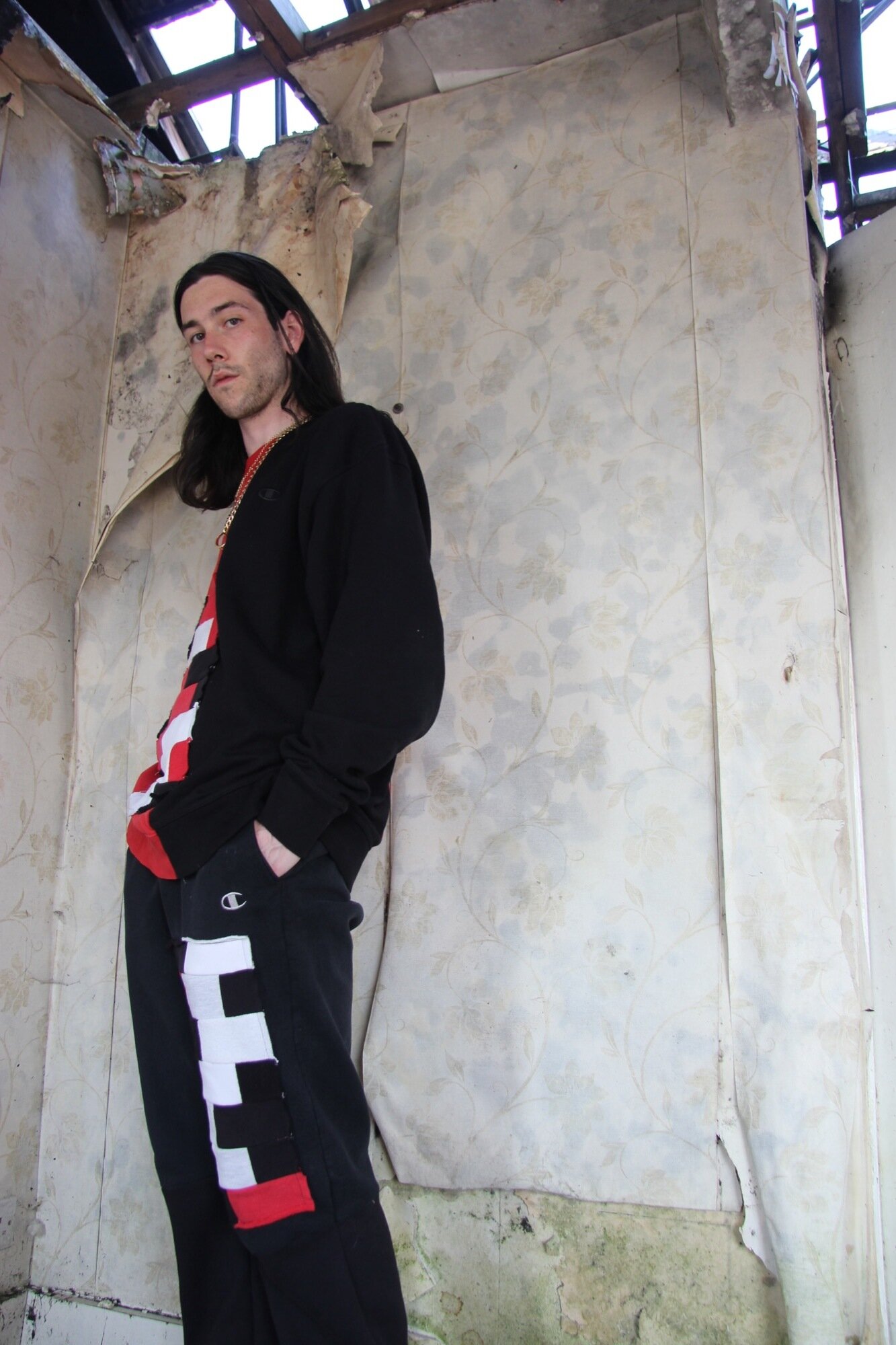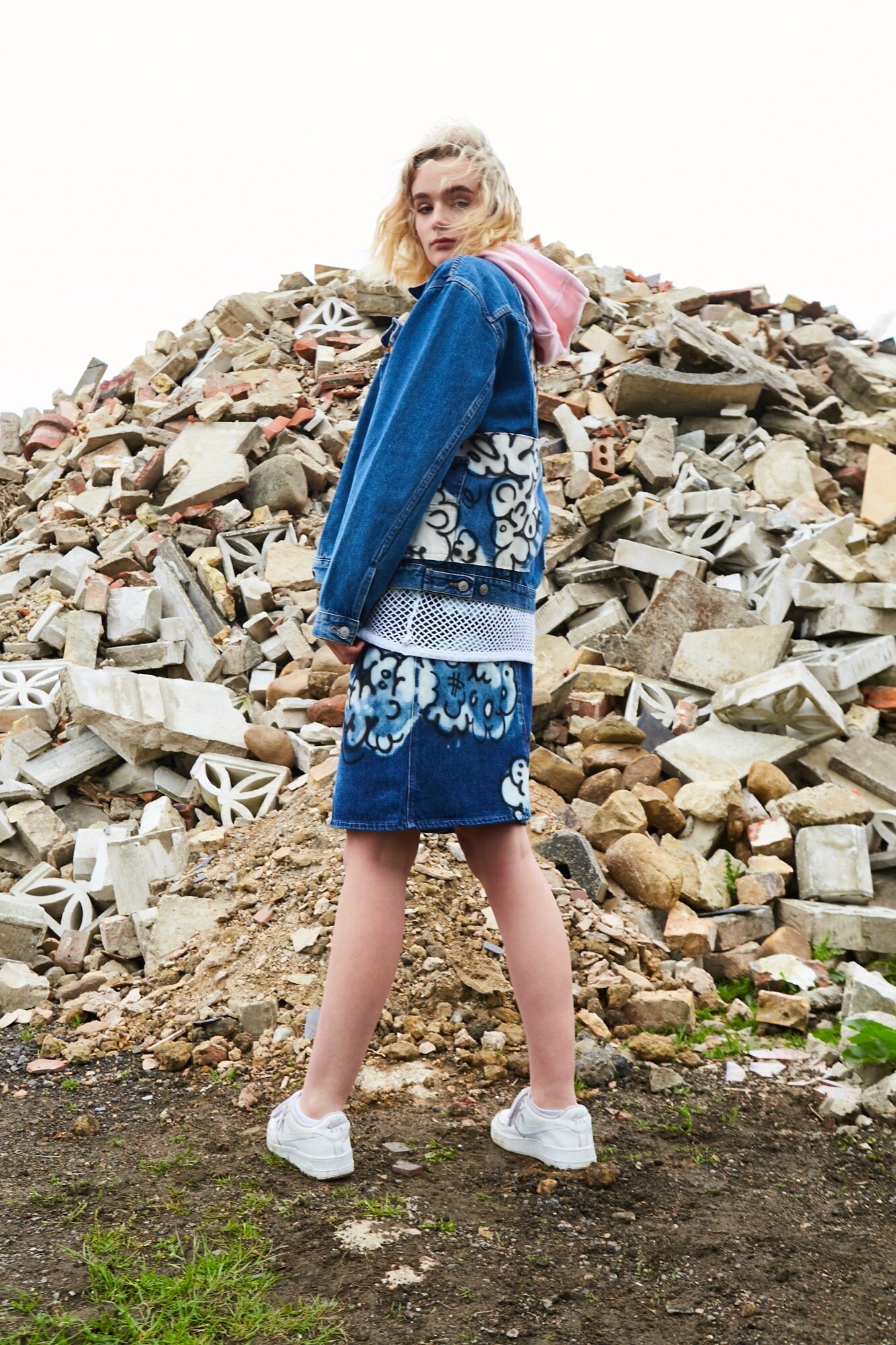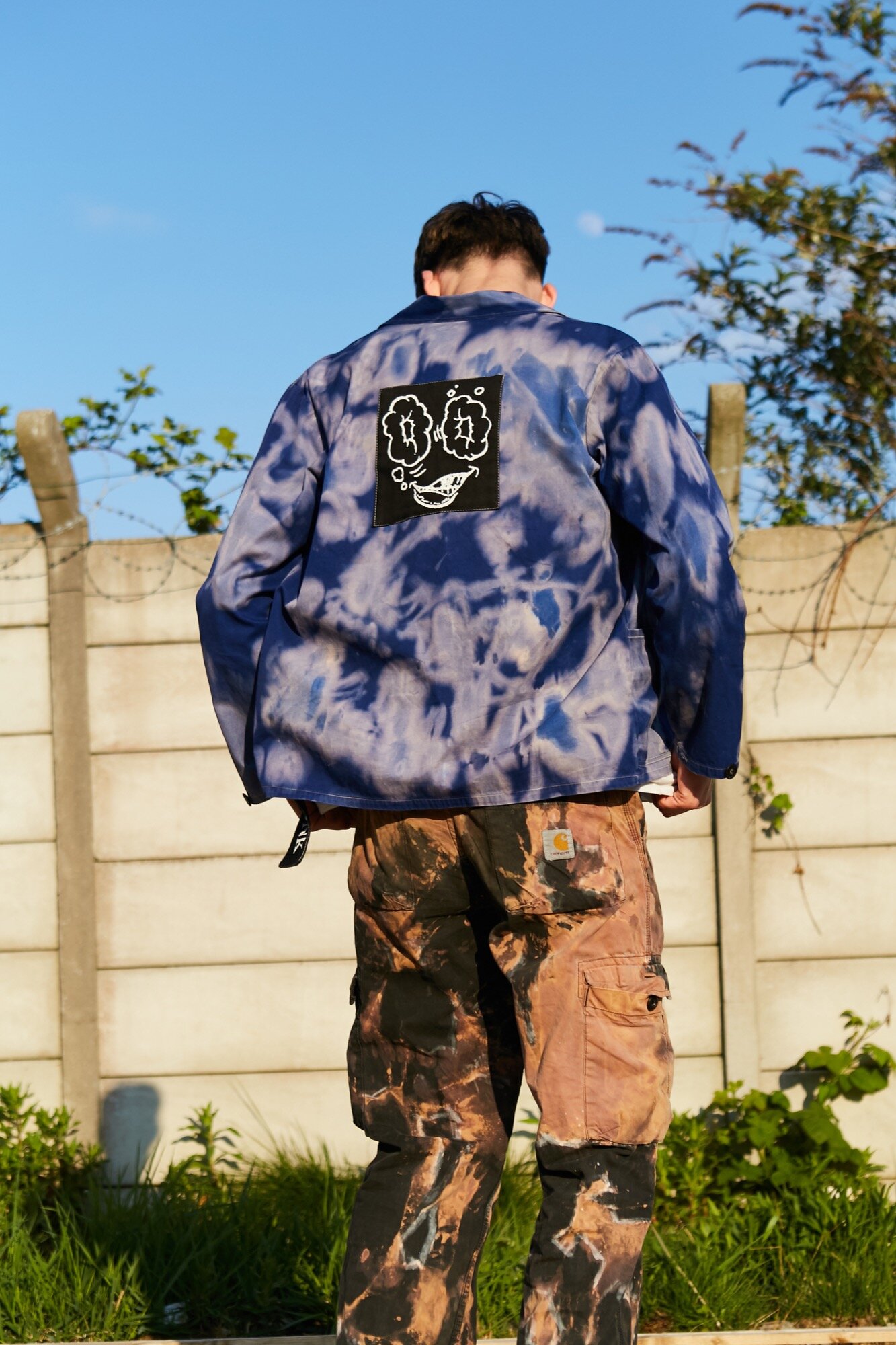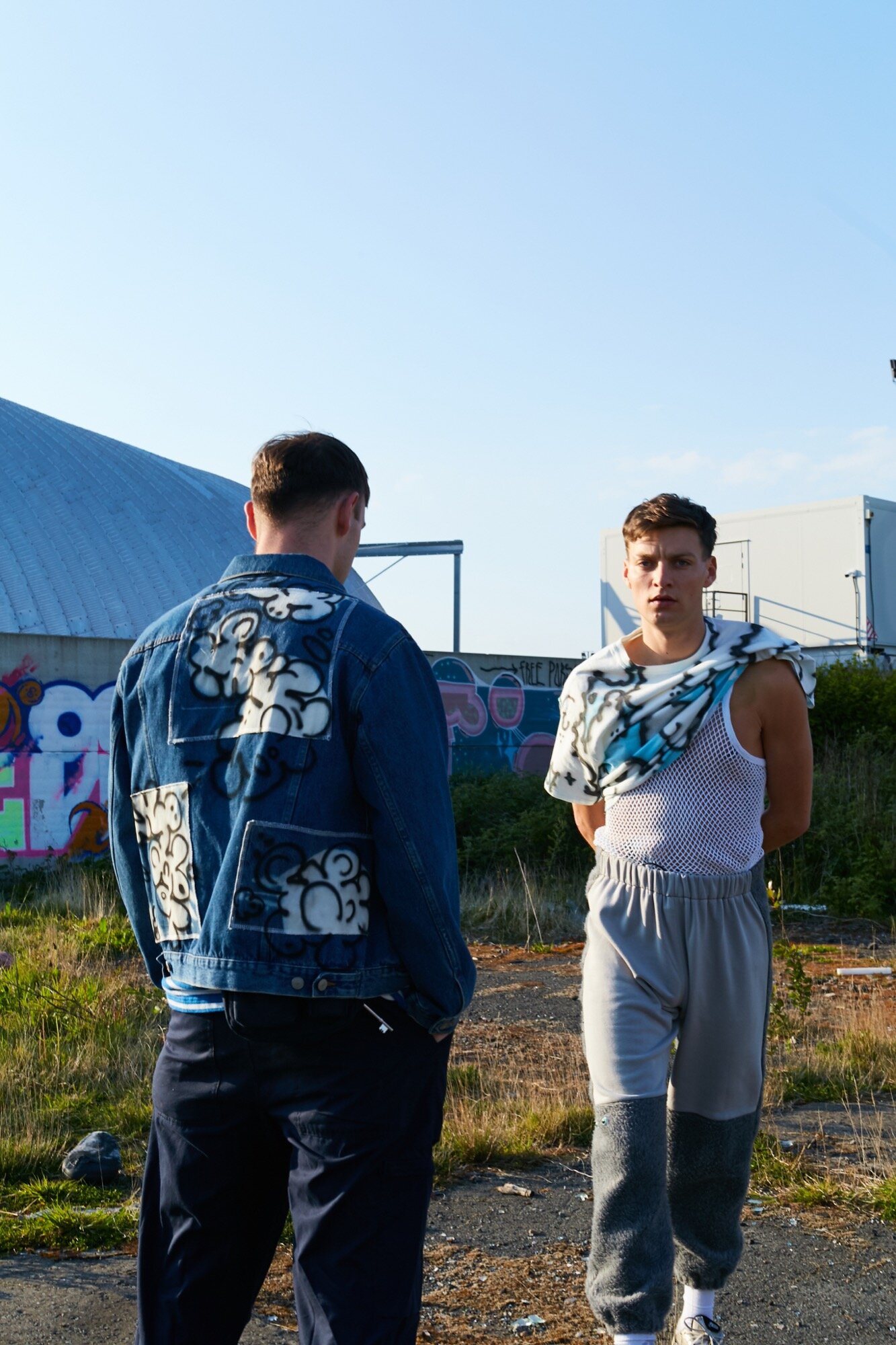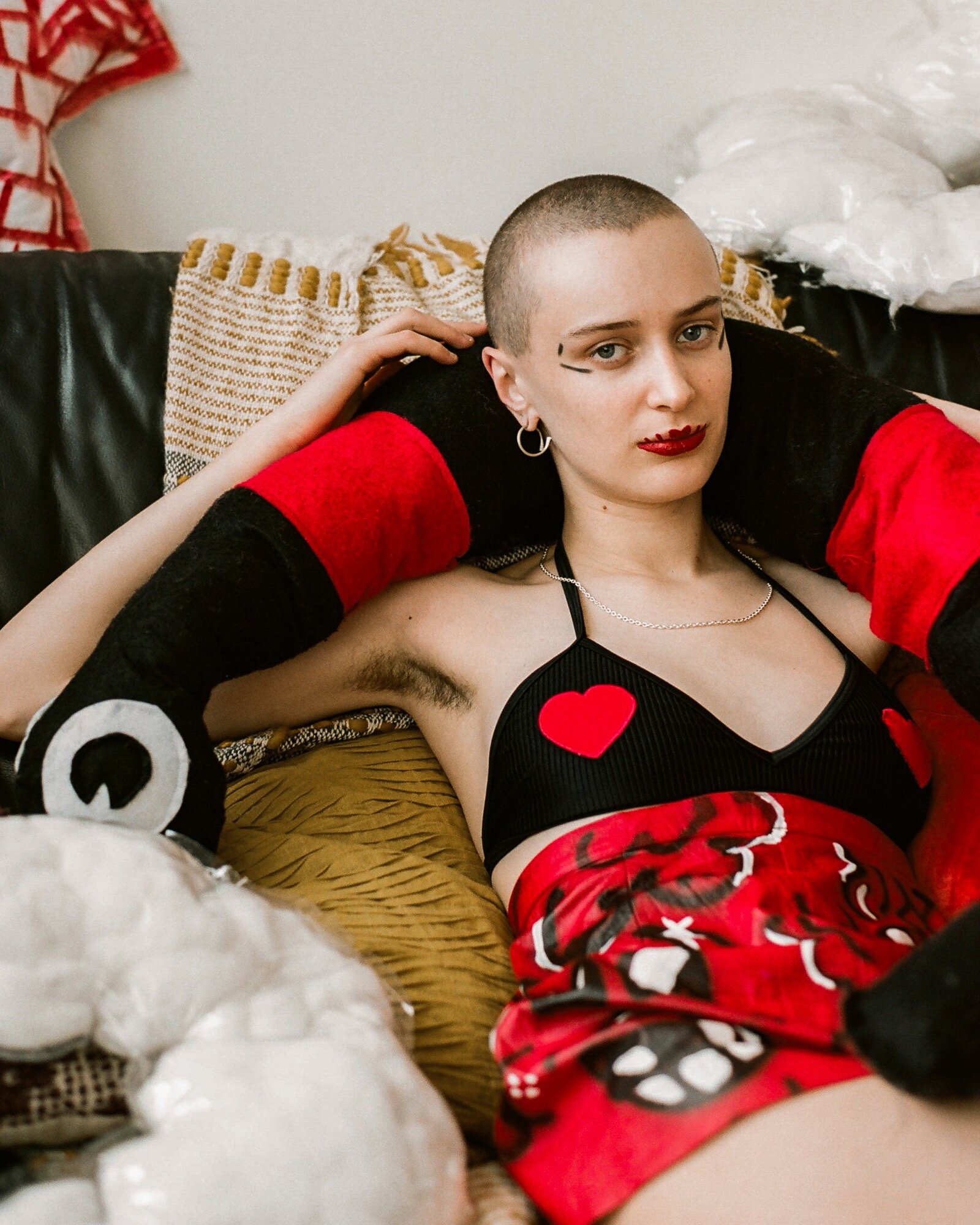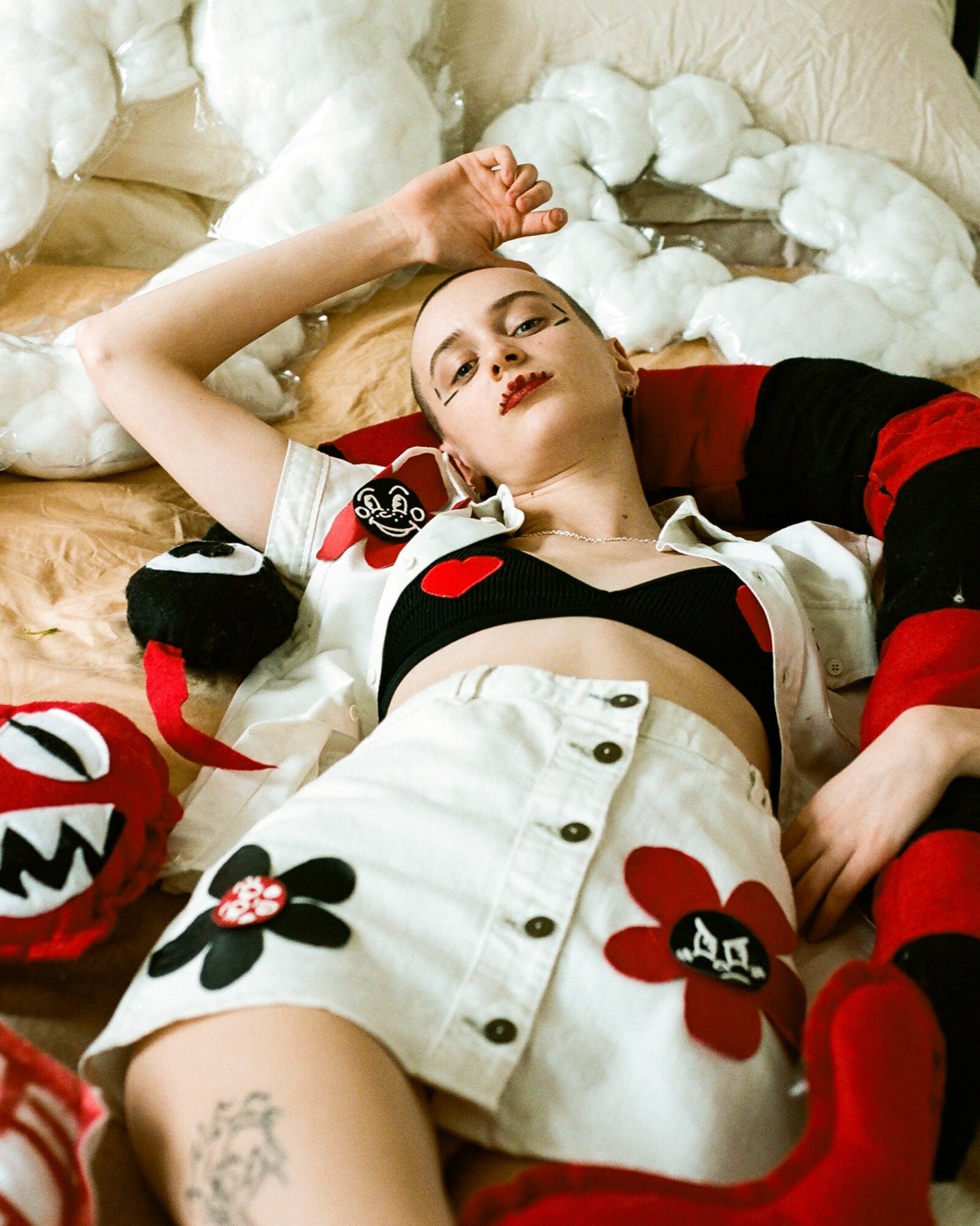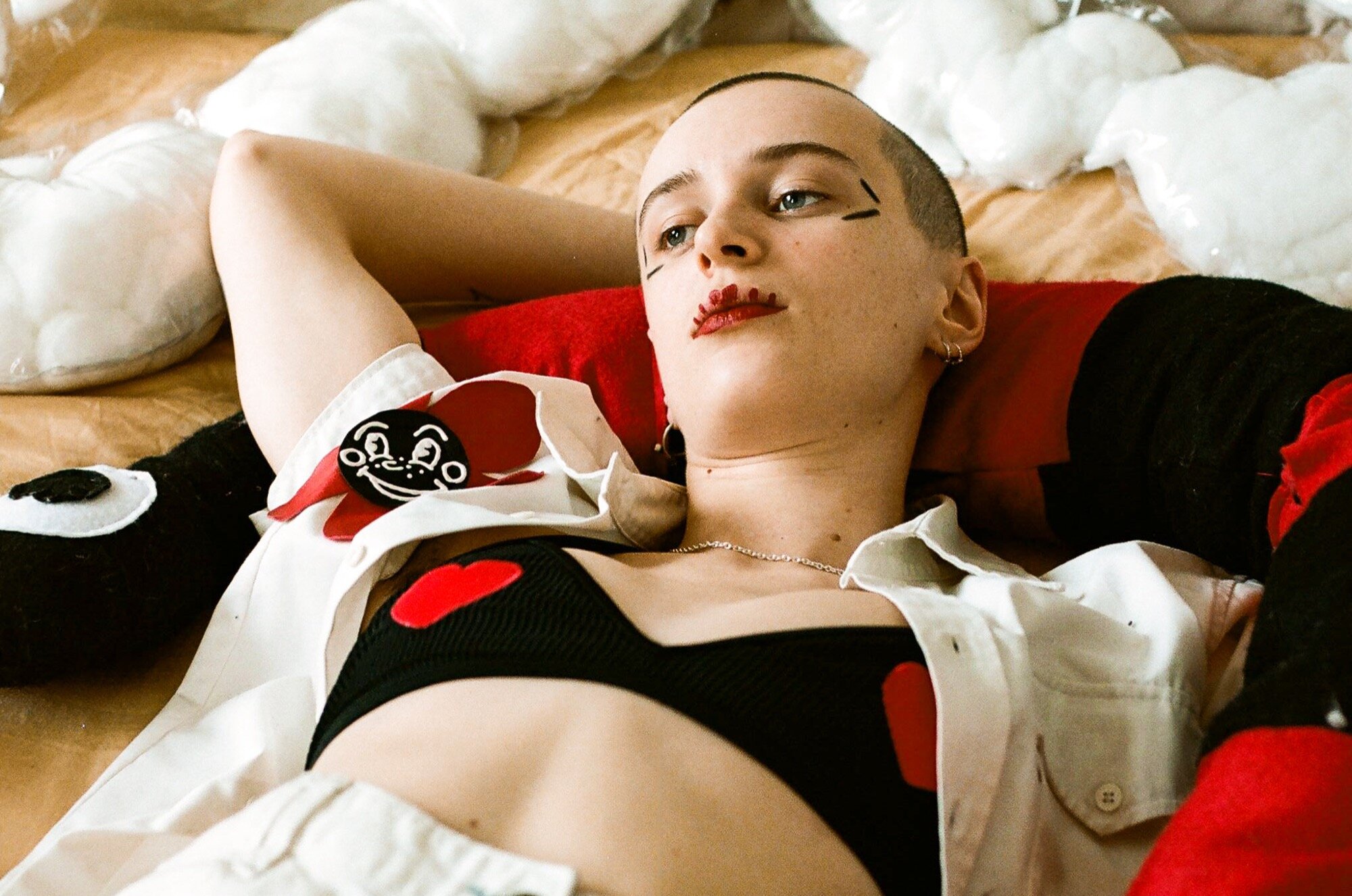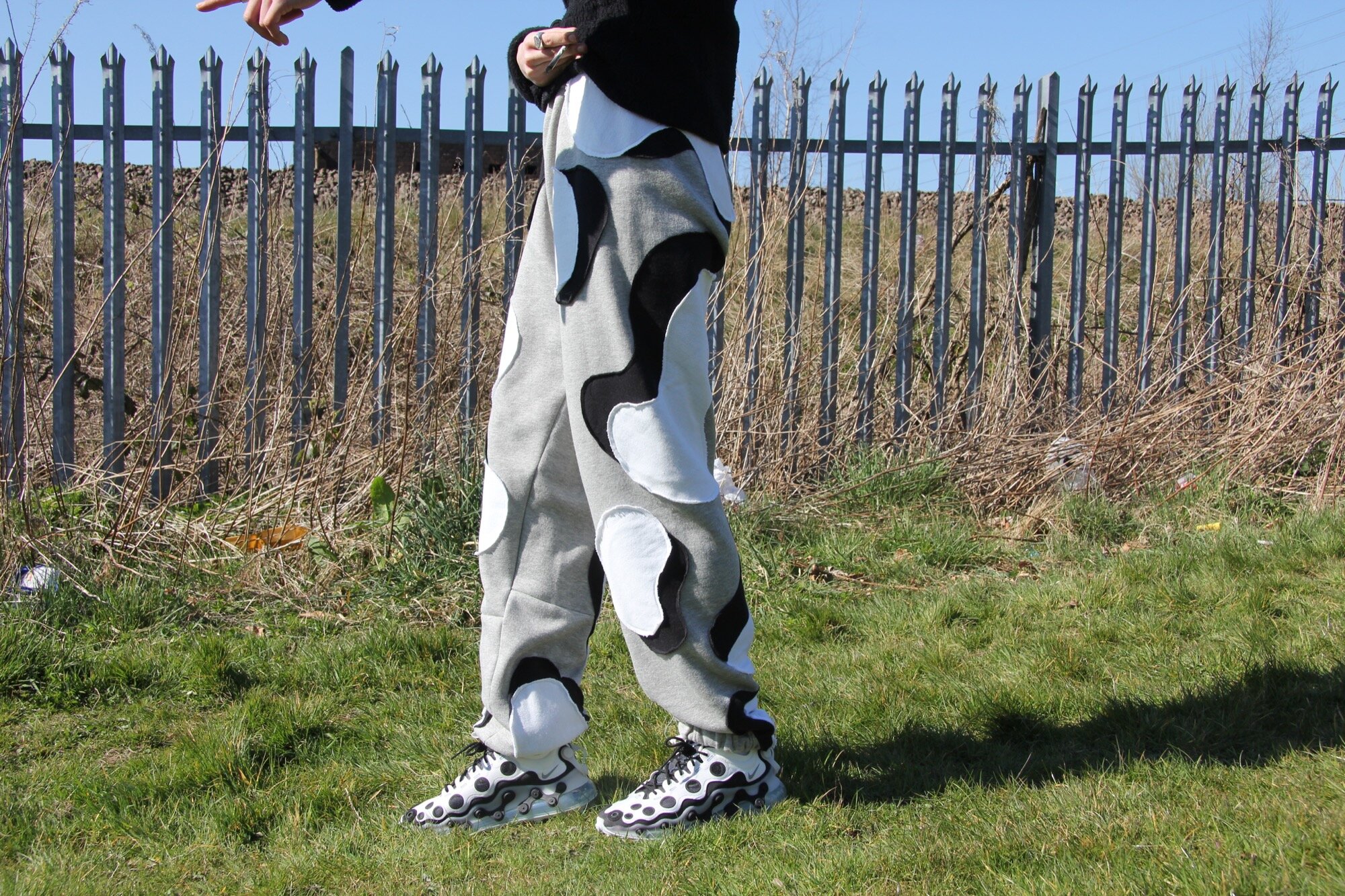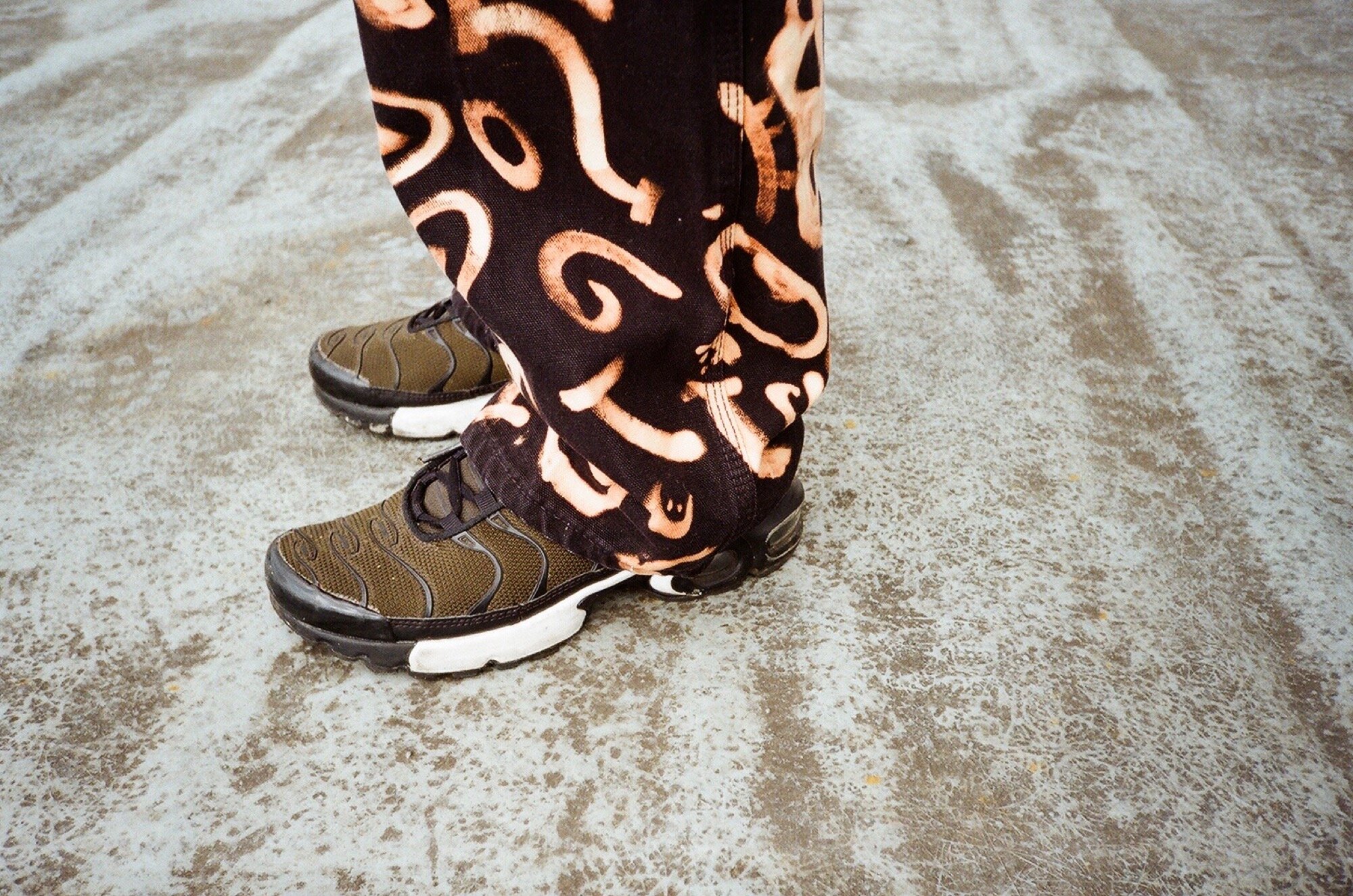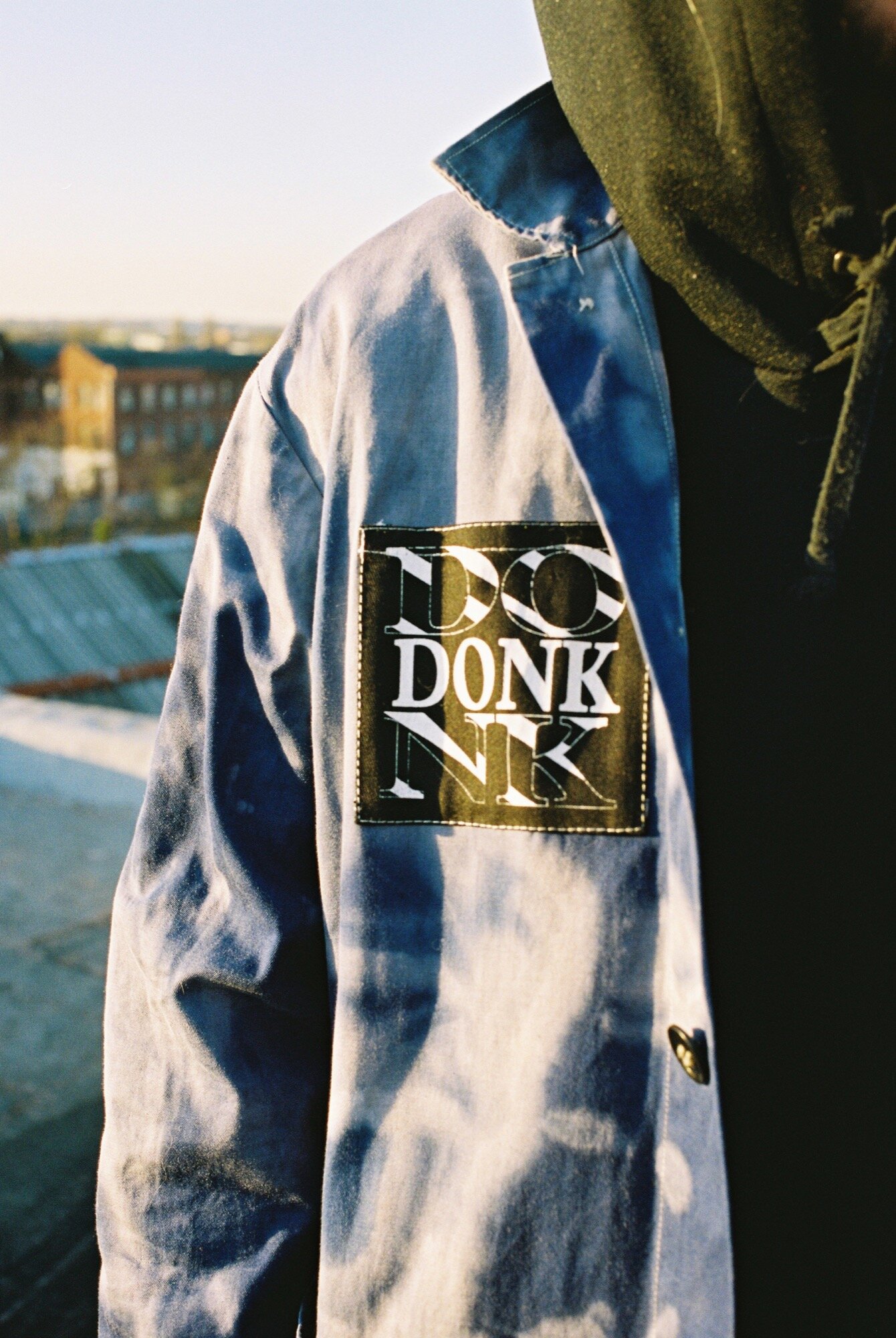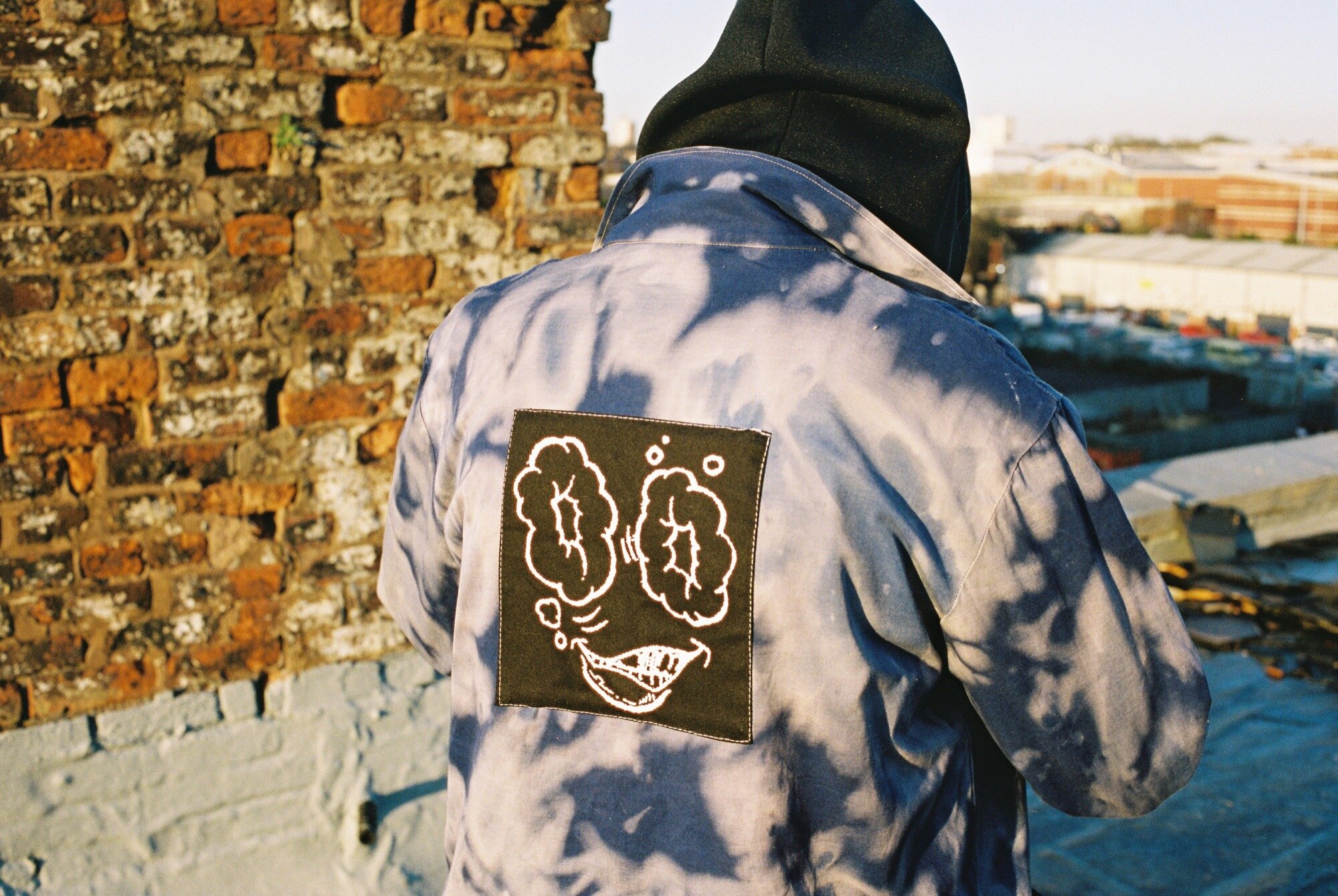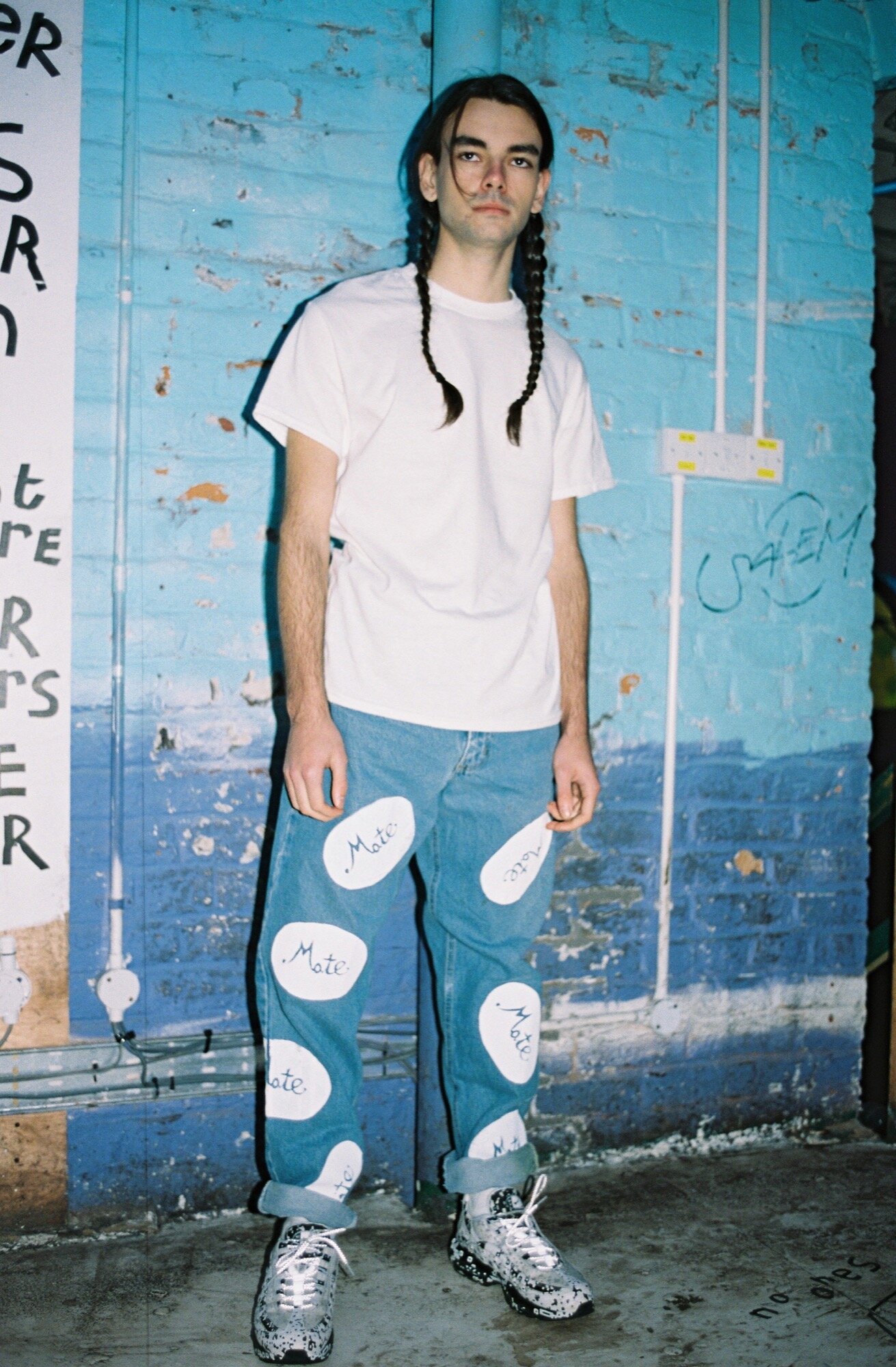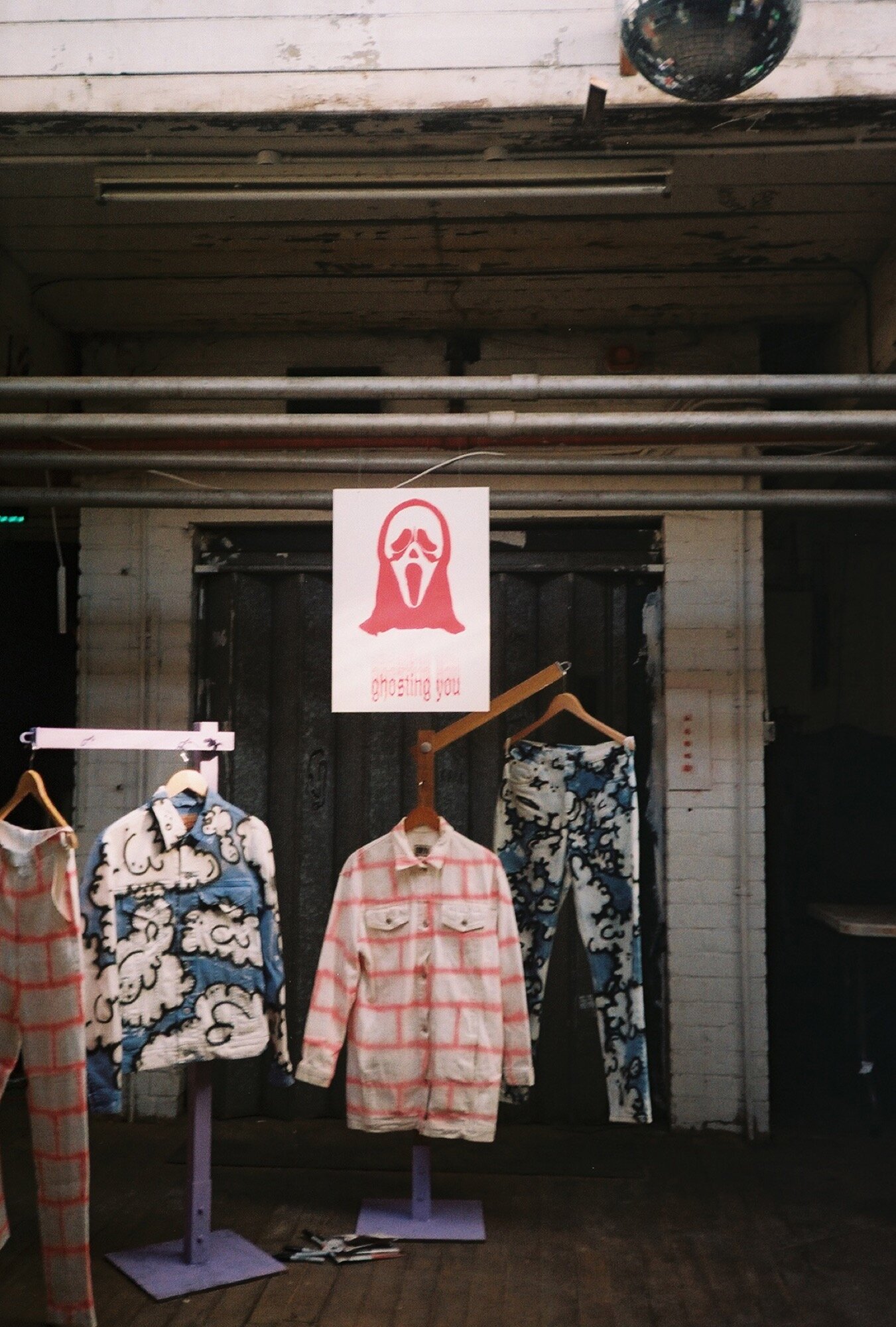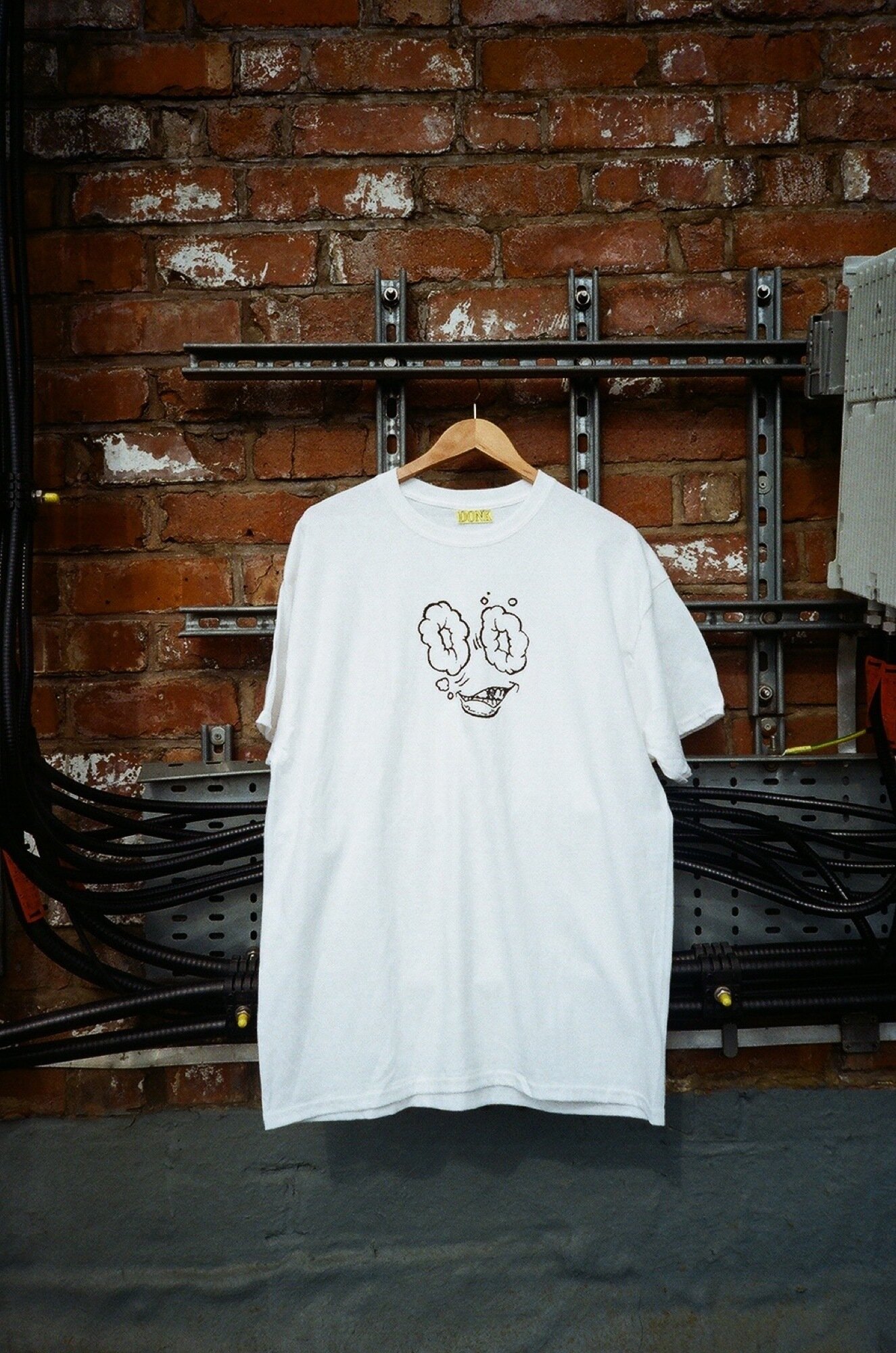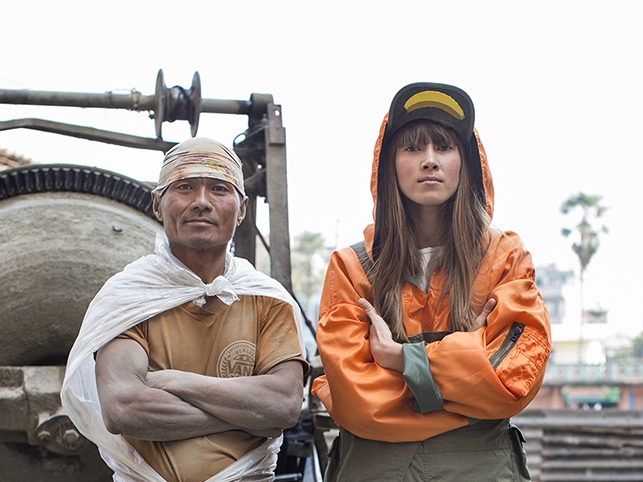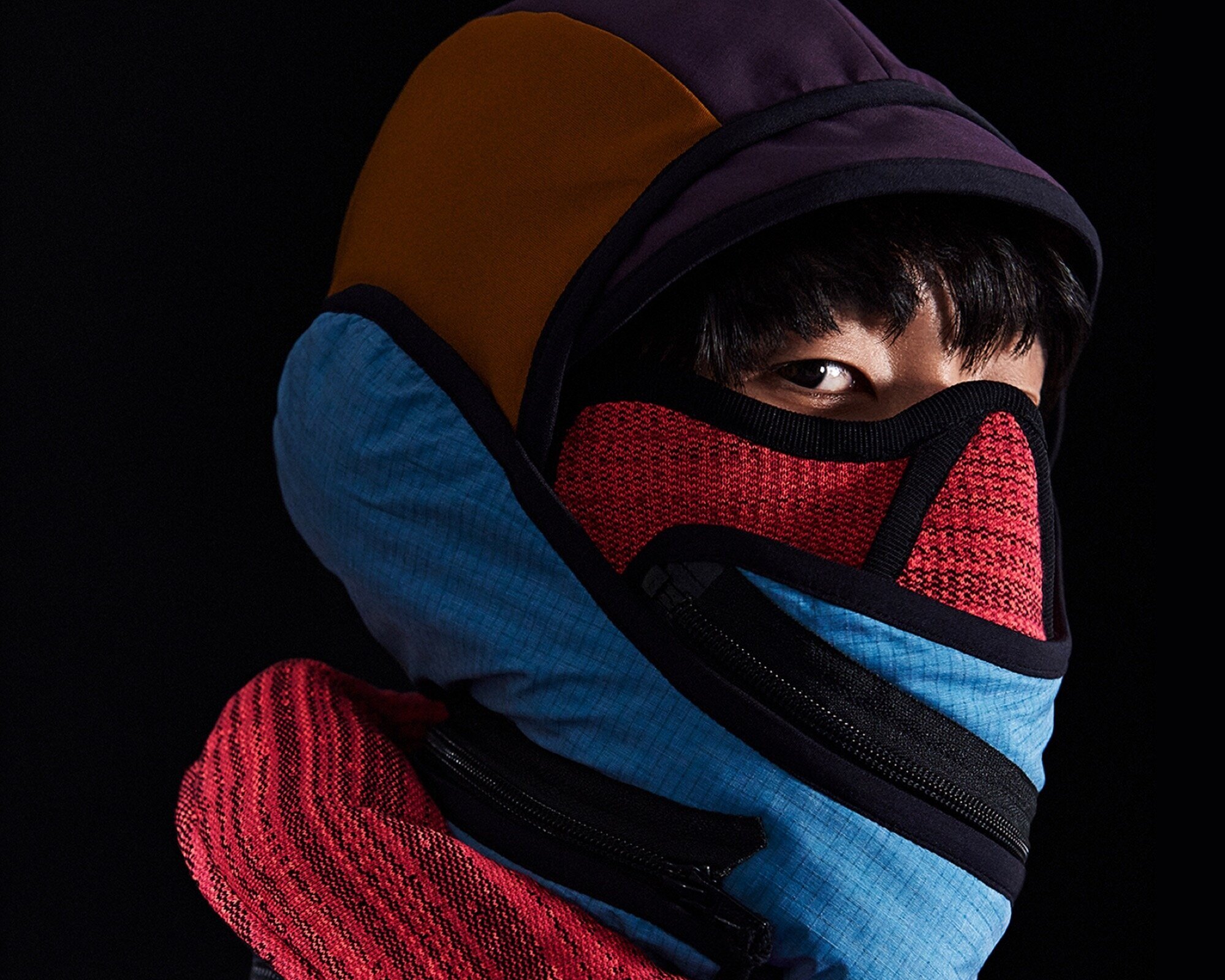DONK & NORTHERN WORKING CLASS CULTURE: REWORKING COUTURE FOR THE BETTER

On the morning of an uncharacteristically hot English spring, Sam Shep sent the Sabukaru Team a photo of a horse chewing on a customised sweater, somewhere on the outskirts of Bolton, UK.
They have a taste for fabric, he says. We’re then sent a snippet of Madi Marcantonatos drying the sweater with a hairdryer. At the peak of English quarantine, their photoshoots are moving away from urban areas, but the hazards are still just as real.
The sweater - now, presumably for personal use - is a custom of their own brand, Donk Wear. The name is a reference to an English genre of music that during the late noughties reached acclaim for baffling a nation and empowering a community. In referencing Donk, the duo are building on the same anti-authority principles that the music genre embodied: that you don’t have to take yourself too seriously to succeed, and importantly, that you don’t have to fit in with the zeitgeist, either. Donk Wear is DIY. Donk Wear is punk.
Customising second-hand garments is nothing new, but Donk Wear do it with a refreshing and lighthearted take that breathes creativity. By utilising airbrushing, bleaching, painting and patchwork, Donk Wear do more than spice up old clothes - through a plethora of smileys, clouds and layered textures, they bring the old back to life, re-inventing pieces, and ultimately, re-affirming them.
Madi Marcantonatos
Sam Shep
The Donk Wear team aim to eschew what has traditionally been called the fashion world whilst building on what it spits out. Levis, Nike hoodies or denim jackets become canvases, whereas corduroy shirts, old trackies, and stray materials see themselves amalgamated into new life. Sustainability is a big motivator here, as well as the prospect for complete creative freedom. “Bring us your old shite”, Donkwear openly invites on Instagram, and they will turn it into something fresh. The intimate interaction involved in 1-on-1 customisation has historically been reserved for expensive, client-based haute couture.
Donk Wear is flipping that on its head. They stand for ‘creative couture’ - where their clients benefit from accessible creative immersion, without the need to belong to the upper echelon of society.
The fashion world’s elitism is no secret. New items of clothing from respected houses can cost more than most people’s monthly salaries, and circles of models, photographers and designers solidify to form an exclusionary ‘us’ and ‘them’ narrative. Consumers peer into these bubbles through barrages of advertisement on social media, like donkeys lunging towards carrots. The fashion world is so close - tangible, almost - but so far. Donkwear flatten this distance.
It is a response to a fashion world that romaticises working-class culture and at the same time closes its doors for the working-class to really be a part of it.
Donk Wear wants to open up fashion. Fuelled by the same frustration that FUBU and the black hip-hop community experienced in New York in the 90s, Donk Wear is ‘for Us, by Us’, except that Us, in this case, stands for everyone.
Building on this inclusive approach, the duo’s perspective on art is just as motivating - “You don’t need a formal education to get into creative careers”, Madi says - and Sam confides in us, saying that your background cannot be a barrier for creative projects. Donk - the music genre - was a largely home-grown affair, and Donk Wear, through a different medium altogether, carry the same torch. When the creative juices around Donk dried up, the genre made a living for itself through remixed pop songs like Katy Perry’s I Kissed a Girl and the Red Hot Chilli’s By the Way. Hopefully, Donk Wear’s story is different: starting with remixes is only the beginning.
The Sabukaru Team caught up with Donkwear to discuss their clothes, the appropriation of cultures, and, of course, Donk.
Firstly, what is DONKWEAR?
Donk is a studio based in Manchester run by a boyfriend/girlfriend multi disciplinary team. From the studio we work together on our self-titled brand ‘Donk’ and in partnership with UK vintage store Cow. The work for Cow is reworking and customising second-hand garments using a range of techniques.
Donk is an ever-growing personal project based around northern working class culture. We also have an ethos of not taking ourselves too seriously. We feel it's important to have fun with our work. Fashion can often take itself too seriously and become challenging. It’s also important to mention ‘Donk’ itself is a hard dance music genre strongly associated with northern working class culture, and is from areas we grew up in!
For readers who may not be too deep into niche music genres, could you describe Donk from your point of view?
Donk is a fast paced genre of dance music strongly associated with northern England. It was first made in the town of Bolton (Lancashire) - Sam’s hometown and where we both currently live. There is a documentary on Vice for a crash course. Bolton is described as a ‘desolate factory town’ in the summary and a ‘shithole’ in the comments. I think this sums up the working class nature of the small towns on the outskirts of Manchester that we were brought up in. There’s a notable association with being northern and being working or lower class in the UK, but we let these stereotypes influence our work in a fun way.
Tell us more about the North, especially Manchester and its rave scene. What attracted you to it? The glory days may have passed but how does this scene still live on? Are there remnants of it?
There’s definitely still strong nightlife and clubbing communities rooted in the city that cross over into creative circles. I (Madi) started spending a lot of time clubbing in Manchester about 6 years ago and still go out with the same people today. There’s a very strong sense of unity and passion when it comes to what they do, which is clear after sticking at it for so long. It was attractive because it was so different from where I was brought up (a small town called Rochdale in Lancashire). There were more like minded people in Manchester and I began to feel more grounded in myself and my interests - cliche but true!
What does Manchester mean to you?
Whilst both of us studied and interned in Leeds and London, Manchester is a city that has allowed us to blossom creatively. This also goes for other young creatives in the city. Manchester also feels like home and very familiar. There is a strong sense of community among different scenes in the city.
Manchester City centre is also where we first met. We were 14 and both moshers (a British term for punk/emo) - not the most fashionable haha, but something we let subtly influence our current work.
Many people connect certain cultures with a special place, like a club, or a park etc. Are there places that come to mind when you personally think of Donk?
We both think parks in general. We’ve all sat on a park or field blaring Donk and Bassline from our phones with a 2bot (£2.50 2litre bottle of cider).
A place that reminds us of Donk is Urbis, a space in the centre of Manchester that was once home to the more extreme subcultures of Manchester like Goth, Punk, Emo, Mosher and scene kids. We both fell into these categories when we were 13 - 16 (it's also the first place we met when we were about 14).
With your label being so heavily influenced by music, can we expect any DONKWEAR nights or events in the near future?
It’s something we’re definitely considering but for now we’d like to keep focusing on exhibitions and fashion shows! Our first show in August 2019 turned into a bit of a night anyway with friends DJing and partying afterwards There’s a radio station in the studio above us called Limbo, with some incredible producers and DJ’s on board. They’re very good friends and we’ve got some ideas for events and potentially a Donk radio show!
Other than rave culture, what other influences do you bring into your works? What hybrid of subcultures are brought into DONKWEAR to make up the unique aesthetic that you have with your output?
I think the best way to describe it is a mashup of influences from subcultures we have appreciated or fell into. A friend described donk as ‘gameboy-cartoon-punk-streetwear’, hahaha! I think our knowledge and interest in collecting vintage garments has had an underlying influence. We’ve unknowingly been researching a colossal amount of clothes over the years. Sportswear and workwear aesthetics are very apparent in our work, however we never like to limit ourselves in what we produce, from women’s swimwear and exhibition installations, for example. Our product scope is wide and fluid - we love trying new things!
How does a piece of DONKWEAR come about?
Mostly, ideas will start from speaking with each other in the car on the drive home. We sometimes draw out designs and create them, but a lot of the time we will kind of make it up as we go along, allowing the fabric and prints to influence the design as we create it and the garment develops. Sam prints onto fabrics and passes them on to Madi to create the pattern and sew up. A lot of items are hand finished after construction using painting, drawing, bleaching and airbrushing.
You draw many references and inspiration from working class culture and turn them into garments and fashion. How important do you think is to bring this culture into the world of fashion?
We both come from working class backgrounds so it's hard for us to do anything else, that’s why it's so naturally prevalent in our work. We think it is very important for an industry such as fashion to be accessible. The working class aesthetic has been absolutely rinsed by the fashion industry in recent years from Stone Island to Burberry. Ironic, after Burberry launched an entire rebranding strategy to downplay the use of the iconic nova check because it was seen as ‘chavy’. Working class culture is prevalent but palatable in the industry. For us, it's how you incorporate it in a genuine way. We don't like to water shit down!
Why do you think clothing is so important to express someone’s beliefs, origin, motivations or simply their personality?
Everybody is into clothes whether they like to admit it or not. We all choose to wear something for a specific reason - even if the intention is to not be fashion conscious. It can be used to feel both individual and part of a collective at the same time. Visually, it's one of the first things we see and it allows us to try and choose how the world views us.
The collaboration with WE COW MANCHESTER seems natural and organic. How did this come about?
Sam was working at Cow Manchester last April and we helped out with a student event by customising some of Cow’s stock as Donk. We did pretty well at the event and shortly after we began working for Cow but it wasn’t a collaboration and we have recently left the company to try and focus on Donk and have a go at the freelance life.
There’s a rise in people abandoning London and moving to other major cities where they can allow themselves to be freer. What would you say to someone who was on the edge in regards to doing this but might be scared that there aren't the same opportunities or similar creative communities?
We’d tell them to go for it! There’s creative circles in Manchester but there’s such a huge creative online presence that we don’t think it really matters! Most of our commissions are outside of Manchester and we’ve probably met more creatives through instagram than anywhere else.
Could you elaborate a bit more about your backgrounds. What did you experience along the way and how did this influence your work?
Our work isn’t ever inspired by fashion. I think that’s one reason why we work so well together. We take inspiration from what’s around us. The culture - whether it be British culture or rave culture - has always got to be something personal to us, but we still need to be able to connect to the audience.
Sam: I’ve grown up in a single parent household with my dad being in and out of prison most of my childhood - but I had a strong set of grandparents that have supported me and helped me get to where I am today. I think this is the case for most kids that have come from similar family situations to myself.
The things that the industry would deem as a set back - like not attending Central Saint Martins, and being brought up by a single mum on benefits - I do not see as a disadvantage. They give me a specific perspective into a culture that people seem to find interesting. It took me until I started to study art to not be embarrassed about where I come from. Our culture has had a space in art and fashion for years, but have our people? With the exception of putting us in front of a camera and telling us to look moody to sell trainers and tracksuits to the masses.
We can’t afford to do unpaid internships or rent flats in London…we can’t even afford to live in Manchester! We live at home with my grandparents and rent our studio and equipment, which means more to us right now than living in central Manchester. Some people don’t even have the privilege of being able to live with family who can enable them to focus on bettering creative skills.
I’ve worked in retail since I was 17. I’m 25 now - mostly working in vintage shops so I get to see a lot of clothes over that time, and this has definitely subconsciously made me want to apply my graphic style to something wearable. In the early days I would just print on fabrics and Madi would whip it up into a dress... but now there's a lot more to our process and it’s developing all the time - especially under the current conditions (lockdown). We’ve had to leave our studio and operate as best we can from home - and I know it’s a really awful time for everyone but this has enabled us to be able to focus fully on DONKWEAR. Maybe after this it’s time to take the leap of faith and go fully freelance but as a creative you constantly doubt yourself.
Madi: I’ve loved drawing for as long as I can remember. I was definitely a big nerd in school and was obsessed with anime and manga as I entered my teens - relentlessly sketching the same thing over until I was happy with it. Osamu Tezuka is still one of my all time top artists! You can see the anime influence in my illustrations today. One thing that influenced the path of fashion was being in a fashion design studio from a young age. My dad was friends with Antony Price (British 80’s glamour designer responsible for dressing the likes of Duran Duran and Mick Jagger) and I would visit every summer from about 4 or 5 years old. He kept 100’s of birds in a beautiful garden including chickens that I would hatch and bring up. At 6 I started sewing little body pouches to carry and keep the chicks warm.
Let’s get into the production of clothes. You use an airbrush to draw on clothes. How do you want your clothes to be worn after the process? With care or would you consider the pieces more as temporary art, that fades through washing and usage?
Airbrushing is a big component in our work. We are conscious of the longevity and quality of our work but as you pointed out these can fall into the category of temporary art. We work individually with each garment using all hand made, non factory techniques that can fade over time.
by Lunar Rising
The garments you’re currently putting out are reworked vintage pieces. Will this always be the core element of what you do or are you planning to create a collection from scratch i.e sourcing and buying new materials at one point?
Our first collection was made from scratch! It just so happened we landed the job with COW customising a few months before the show. Pieces made from scratch take much longer than items that are ready to be customised so we try to keep a good balance between the two. We both already had a strong interest in collecting vintage garments and had some experience customising before we met so it feels very natural. Sustainability also comes into it. Of course it's fantastic designing and making jeans in a factory, but why when millions exist already? We’re not a big fashion brand with loads of money to throw at things, we constantly have to be resourceful but that’s what makes our work.
Where can we get your clothes and are there any plans to expand the brand?
We’re trying to expand the brand now. A strange time to be doing it but we never stop! We’re trying to expand our online presence and selling platforms as we’ve just been selling bits through instagram. We have no access to our studio right now so we’re really focusing on aspects of the brand other than making clothes. We were also in the middle of opening our own studio shop! We hope to run a kind of open studio where our customers can see where the magic happens and really get involved with the process. We love collaborating with people who already have an idea for us to put our Donk twist on. This level of interaction with customers and creatives is pretty much unheard of anywhere other than Haute Couture fashion. We want to bring this idea of inclusivity to those who may otherwise never get it - we’re Customised Couture.
What’s next for DONK?
We’ve got a few interesting projects and collaborations coming up but we don't want to jinx them so you’ll just have to wait and see!
Thank you a lot for your time!
Text and interview by Jacob Negus Hill & Adrian Bianco



